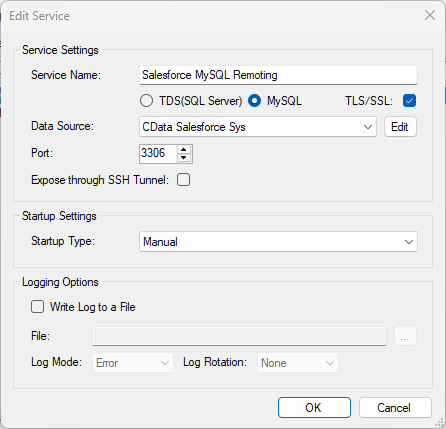Discover how a bimodal integration strategy can address the major data management challenges facing your organization today.
Get the Report →How to create Google Sheets federated tables in MySQL
Use the SQL Gateway and the ODBC Driver to set up federated tables for Google Sheets data in MySQL .
You can use the SQL Gateway to configure a MySQL remoting service and set up federated tables for Google Sheets data. The service is a daemon process that provides a MySQL interface to the CData ODBC Driver for Google Sheets: After you have started the service, you can create a server and tables using the FEDERATED Storage Engine in MySQL. You can then work with Google Sheets data just as you would local MySQL tables.
Connect to Google Sheets Data
If you have not already done so, provide values for the required connection properties in the data source name (DSN). You can use the built-in Microsoft ODBC Data Source Administrator to configure the DSN. This is also the last step of the driver installation. See the "Getting Started" chapter in the help documentation for a guide to using the Microsoft ODBC Data Source Administrator to create and configure a DSN.
You can connect to a spreadsheet by providing authentication to Google and then setting the Spreadsheet connection property to the name or feed link of the spreadsheet. If you want to view a list of information about the spreadsheets in your Google Drive, execute a query to the Spreadsheets view after you authenticate.
ClientLogin (username/password authentication) has been officially deprecated since April 20, 2012 and is now no longer available. Instead, use the OAuth 2.0 authentication standard. To access Google APIs on behalf on individual users, you can use the embedded credentials or you can register your own OAuth app.
OAuth also enables you to use a service account to connect on behalf of users in a Google Apps domain. To authenticate with a service account, you will need to register an application to obtain the OAuth JWT values.
See the Getting Started chapter in the help documentation to connect to Google Sheets from different types of accounts: Google accounts, Google Apps accounts, and accounts using two-step verification.
Configure the SQL Gateway
See the SQL Gateway Overview to set up connectivity to Google Sheets data as a virtual MySQL database. You will configure a MySQL remoting service that listens for MySQL requests from clients. The service can be configured in the SQL Gateway UI.

Create a FEDERATED Server and Tables for Google Sheets Data
After you have configured and started the service, create a FEDERATED server to simplify the process of creating FEDERATED tables:
Create a FEDERATED Server
The following statement will create a FEDERATED server based on the ODBC Driver for Google Sheets. Note that the username and password of the FEDERATED server must match a user account you defined on the Users tab of the SQL Gateway.
CREATE SERVER fedGoogleSheets FOREIGN DATA WRAPPER mysql OPTIONS (USER 'sql_gateway_user', PASSWORD 'sql_gateway_passwd', HOST 'sql_gateway_host', PORT ####, DATABASE 'CData GoogleSheets Sys');
Create a FEDERATED Table
To create a FEDERATED table using our newly created server, use the CONNECTION keyword and pass the name of the FEDERATED server and the remote table (Orders). Refer to the following template for the statement to create a FEDERATED table:
CREATE TABLE fed_orders ( ..., shipcountry TYPE(LEN), orderprice TYPE(LEN), ..., ) ENGINE=FEDERATED DEFAULT CHARSET=latin1 CONNECTION='fedGoogleSheets/orders';
NOTE: The table schema for the FEDERATED table must match the remote table schema exactly. You can always connect directly to the MySQL remoting service using any MySQL client and run a SHOW CREATE TABLE query to get the table schema.
Execute Queries
You can now execute queries to the Google Sheets FEDERATED tables from any tool that can connect to MySQL, which is particularly useful if you need to JOIN data from a local table with data from Google Sheets. Refer to the following example:
SELECT fed_orders.shipcountry, local_table.custom_field FROM local_table JOIN fed_orders ON local_table.foreign_shipcountry = fed_orders.shipcountry;






